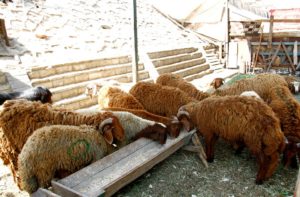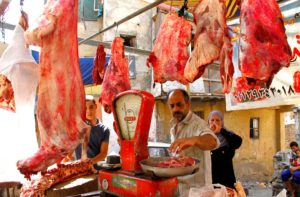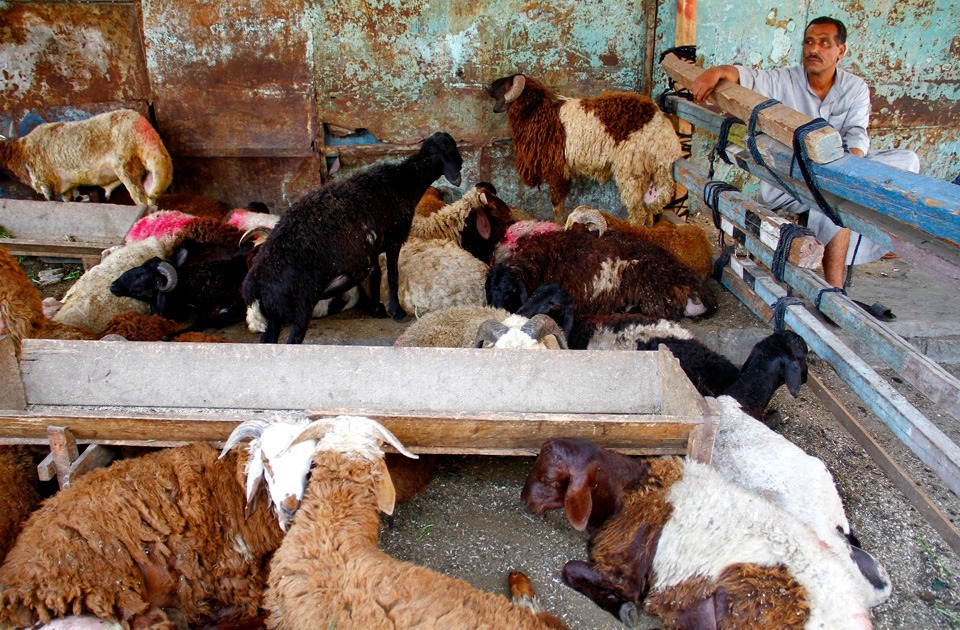Butchers are an essential part of the Eid Festivities here in Egypt – one could go as far as to say that they’re the main event! We Egyptians all share a memory of seeing the butcher work his magic in the street, right after the Eid prayer. The slaughter tradition runs deep within Muslim culture in Egypt.
For those of you who aren’t familiar with the tradition’s origins, the slaughter celebrates the moment that God stopped the Prophet Ibrahim the moment before he sacrificed his son, and asked him to kill a sheep instead. That day became a holy day, the Adha Feast.
Since Butchers are a big part of the Eid Festivities, we thought we would dedicate this piece to them. We’ve only seen Eid from our perspective, it’s time to see it from theirs.
Hamada has been my family butcher for years, I remember meeting him when I was only 15 when he came for the slaughter in our factory grounds in Obour.
Hamada insisted that he is “a simple man.” He wakes up, goes to work, and comes back to his family after 5. His business, however, is far from simple. Many believe that the work of a butcher starts and ends with meat, but that’s a huge misconception.

Photo Via: Ahram Online
“The meat business in Egypt is very lucrative, at least it was when Egypt was economically stable,” says Hamada. He then admitted that he has been struggling since 2011 because people simply “aren’t buying meat anymore”.
Any other day, Hamada works a normal 9 to 5 job, during which he either slaughters animals, checks the meat, deals with customers, or does the store’s books. On Eid, however, his day is very different.
“I barely sleep the few days before Eid!”
He joked with me on the phone. The days before Eid, Hamada is usually busy delegating tasks amongst his staff, assigning them each different locations and customers to serve. Although he doesn’t really need to, he ensures that he’ll visit his favorite customers himself on Eid mornings.
Usually, clients are expected to procure the sheep themselves. However, for Hamada’s clients, he will go out the day before Eid to pick up whatever the customer wants, be it a sheep, cow, or whatever else. The customer then reimburses him for the cost of the animal as well as the slaughter. He’ll then either keep the sheep with him or at the place of sacrifice the night before Eid.
On the morning of Eid, either Hamada or one of his employees will meet the client at their requested location. Usually, people will choose to have their sheep slaughtered in specifically designated areas of the street, or on their private property. Recently, however, the government banned slaughtering on the street.
The new regulations, in conjunction with the COVID-19 pandemic, have caused Hamada to lose a lot of business. Hamada elaborated: “My clients have decided to stop sacrificing with their own means. They now trust charity organizations to do it for them instead. This is great for the charities but, unfortunately, it has cost me a lot of money.”

Photo Via: Ahram Online
After exchanging pleasantries with the client, Hamada (or one of his employees) proceeds with the sacrifice, cleans the meat, and separates it into however many pieces the client requests. That entire process takes up to 2 hours – on a good day.
He joked that he often has to deal with the picky grandmothers that take their time to check that everything is cut just the right way – which can take a long time!
He then repeats the process 3 or 4 more times during the day. Sometimes, he sacrifices animals on the second day of Eid too.
Eid is the most lucrative time of the year for Hamada and other butchers, so they all look forward to it very dearly.
Hamada had insisted on being referred to as ‘simple man’ during his interview because he wanted our readers to know that being a butcher doesn’t make him inhumane or a monster. He shared:
“It’s a job, just like yours. My dad was one. I am one.”
This Eid, give your Butchers some extra love – they deserve it!




























